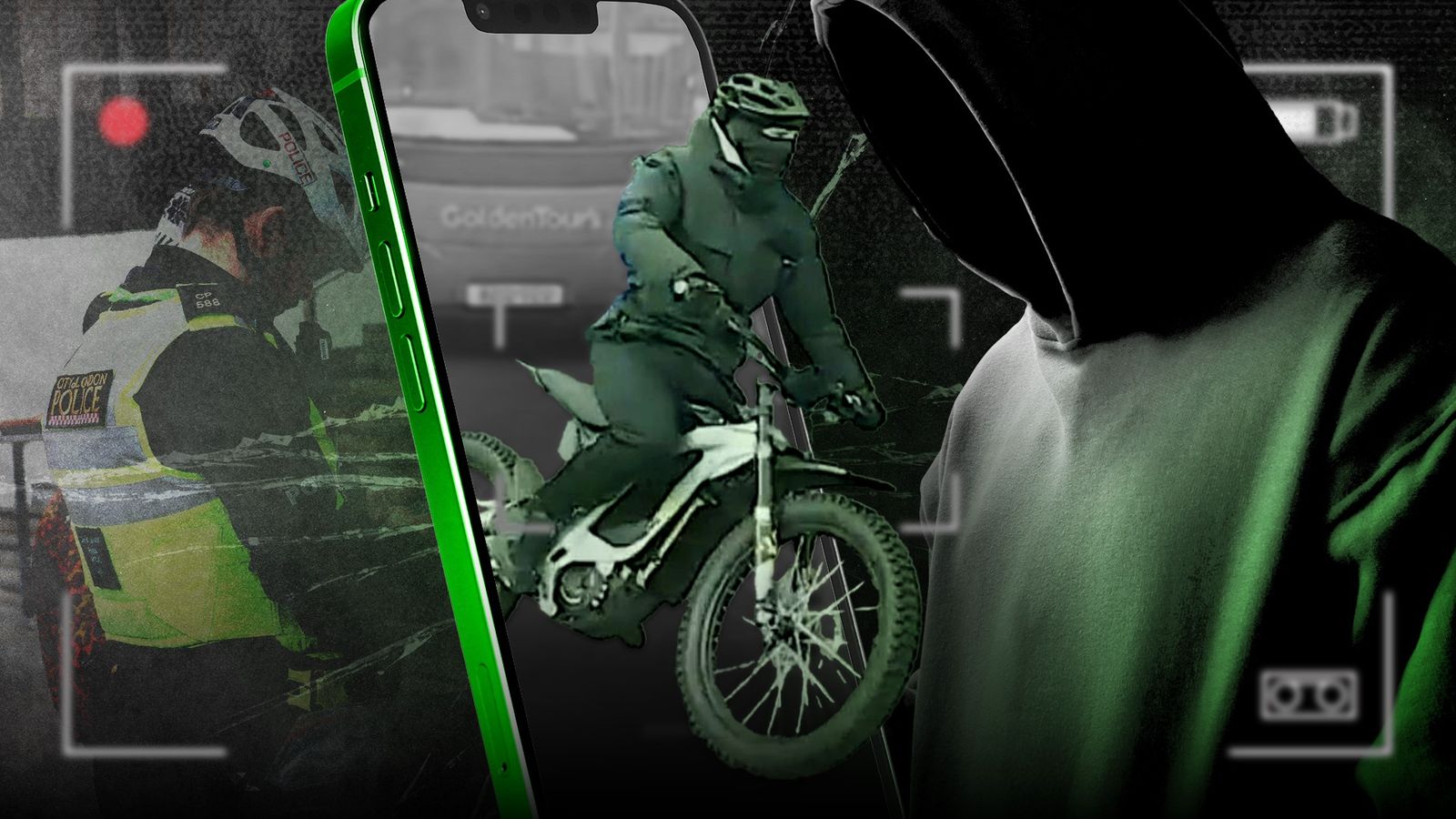We’re out on the street for a matter of seconds before PCs David Parker and Jake Dean shoot off on their bikes through the pre-Christmas traffic. They are in pursuit of an e-scooter being ridden on the pavement near London’s Liverpool Street Station.
It’s illegal to use privately-owned e-scooters in public in the UK. The officers seize it and take it to “the cage” – a lock-up behind nearby Bishopsgate police station – from where it will be taken away and crushed.
Then, the officers are straight onto their next target – a powerful e-bike that can reach speeds far higher than the 15.5 mph allowed by law.
City of London Police sergeant Stu Ford says they could be out doing this all day, every day. They’ve confiscated more than 400 electric vehicles, which can hit speeds of up to 75 mph, in the 18 months since he relaunched the force’s bike unit, to help tackle phone snatching along with drug and road offences.
Many of those belonged to food delivery riders or commuters, including a high-powered stockbroker, who, he says, may not have been aware they were breaking the law. But they’re “also being used for all sorts of criminality” adds Sergeant Ford.
Figures obtained by Sky News suggest crimes involving e-bikes and e-scooters have soared by more than 730% in the last five years.
The data released by police forces in England and Wales in response to freedom of information requests reveals tens of thousands of offences, such as theft, robbery and burglary, have been linked to the vehicles since 2019.
The figures also include crimes such as drug trafficking, stalking, arson, sexual offences including rape, violent crimes and weapons offences.
Sgt Ford says he’s not surprised by the rise in crime, with the availability of electric vehicles so much greater than five years ago.
He says criminals are attracted to them because of their relatively low cost compared to motorbikes or mopeds – a good model can sell for under £1,000 – and discreteness – they’re not picked up by automatic number plate recognition (ANPR) cameras.
A total of 11,266 crimes were recorded in the year 2023/24 that mentioned electric bike, e-bike, electric scooter, or e-scooter, up from 1,354 in 2019/20 – a 732% rise, according to the data released by 36 of the 43 territorial forces in England and Wales.
In one incident in North Wales last year, a woman and her partner were followed by two males on an e-bike, one who was holding a knife, in an apparent bid to steal their scooter.
The same force disclosed details of crimes including a victim who was robbed of his e-bike by people “brandishing machetes and knives”, and another who was repeatedly punched to the head by an offender who tried to steal his electric vehicle.
The true figures will be far higher as two of the country’s largest forces – the Metropolitan Police and West Midlands Police – were unable to supply data.
Separate figures released by the Met, however, show 352 robberies, or around one a day, were committed last year in London alone by a suspect riding an e-bike.
The figure was a rise of more than 40% from the 250 robberies in 2022/23 and a more than 260% increase from the 97 the previous year, although the force didn’t start recording such offences until mid-June 2021.
“I’m not surprised there’s a huge increase in crimes in relation to e-scooters and e-bikes,” says Sgt Ford, who acknowledges “phone snatchers are getting very good at what they do”.
They’re “good cyclists” who often use bikes that have been illegally converted to have a motor more powerful than the 250 watts which is legally allowed, and even wear special sticky gloves so they can grab onto the phones, he says.
Sgt Ford says many are members of organised gangs, with different riders sometimes seen using the same bikes around the capital.
The number of “snatch thefts” soared by 150% with an estimated 78,000 people losing their phones or bags in England and Wales up to March 2024, according to the latest government figures.
Joyce Ong had her iPhone snatched out of her hand by an e-bike rider wearing a hoodie as she went to order an Uber outside North Harrow station, in northwest London, on Halloween.
“It was dark. There was no one about and someone came along from behind me – a dark shadowy figure – and snatched my phone while I was calling an Uber,” she says.
“He just rode from behind on the pavement at a very high speed.”
Joyce says she was left “shocked and confused”, and also inconvenienced by not being able to use her phone to run her business.
She says she reported the crime to the Metropolitan Police but got the impression they couldn’t prioritise her case. Three weeks later, she received a notification that her phone had ended up in Shenzhen, a city in southeastern China.
“I do think the Met Police may not have all the resources they need. It seems to be getting a bit out of control,” she says.
The Met said they’re “taking action to clamp down on phone thieves and robbers, with proactive and neighbourhood policing teams increasing patrols, including in plain clothes”.
“We are also working with local businesses to share information and using a range of tactics and technologies to bring perpetrators to justice.”
Last month the force said Kymani Wilson, 22, from Brent, northwest London, and Claude Parkinson, 25, from Islington, north London, were jailed after committing mobile phone robberies and thefts while riding e-bikes in the upmarket boroughs of Westminster, Kensington and Chelsea.
Sgt Ford insists police are “catching up” and his team have also enjoyed some high-profile successes, with other forces around the country now coming to him for advice.
Sonny Stringer, 28, from Islington, north London, was jailed for two years in August after stealing 24 phones in a single morning. He was doing speeds of up to 50mph on an electric motorbike.
The vehicles have also been linked to stabbings and shootings. Police in Birmingham found a loaded gun after tackling masked e-bike rider Antonio Balu, 25, when he raced away after officers spotted him acting suspiciously, and he was later jailed for five years.
They are also increasingly popular with drug dealers, says Sgt Ford. “They can go around almost unseen,” he says. “If you’re in a vehicle, then you’ve got a registration plate or a motorbike or a moped. With these, you’re just riding a bike around.”
Some shops, he says, are selling powerful e-bikes for up to £2,000 without warning customers they can’t be used on public roads, while there are kits available online which allow people to convert a pedal cycle into an illegal e-bike relatively easily.
“Food delivery guys will ride up onto the pavements, weaving in and out of people. We get accidents happening more and more now where they’re hitting pedestrians,” he says.
“It is increasing all the time and it’s really dangerous. The speeds that these get up to – we’ve had ones that will do 75mph – the speed of a motorcycle.
“And if something that weighs the best part of 100kg hits you at 50, 60 mph, you’re probably not going to be around to talk about it.”
































+ There are no comments
Add yours